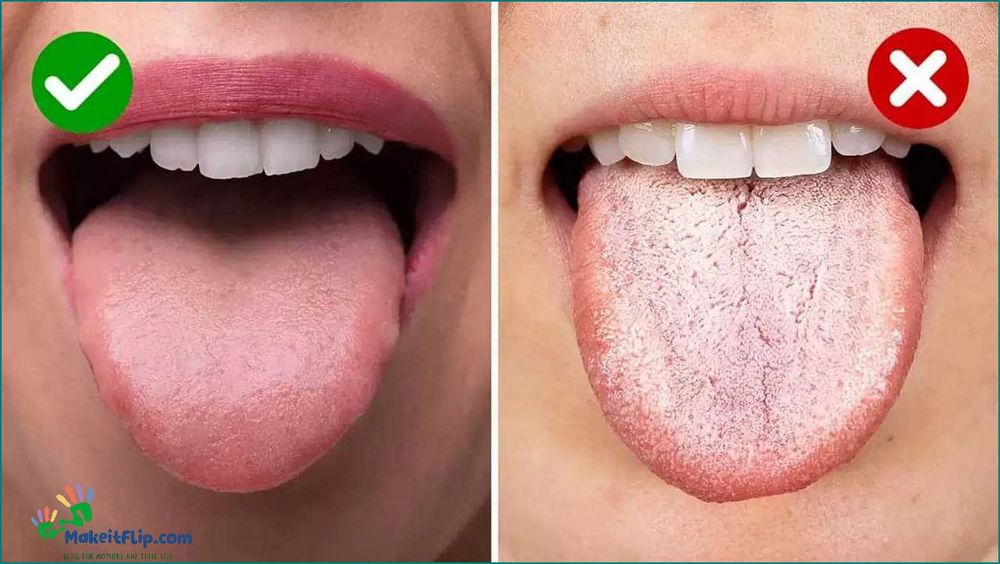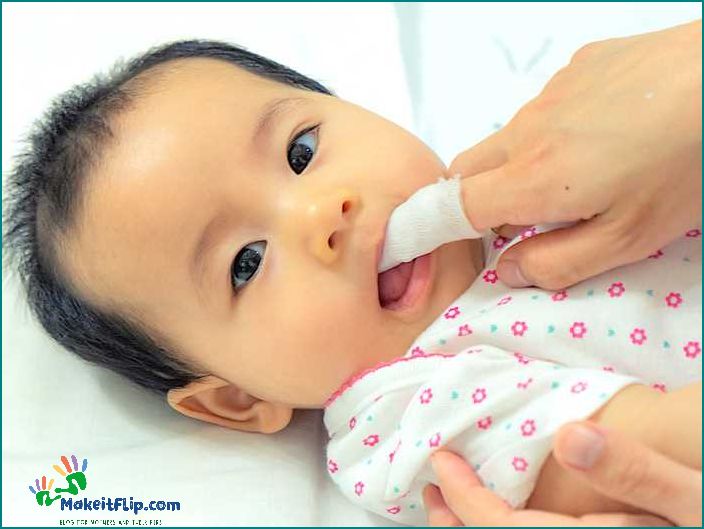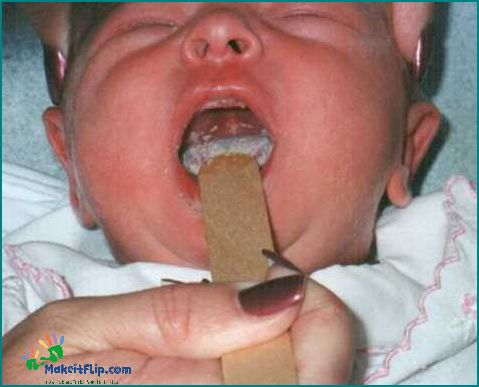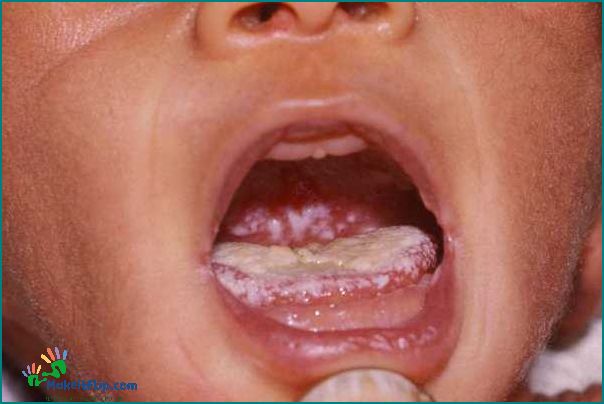Contents
- 1 Causes, Symptoms, and Treatment of Baby White Tongue: Everything You Need to Know
- 1.1 Causes of Baby White Tongue
- 1.2 Symptoms of Baby White Tongue
- 1.3 FAQ about topic Baby White Tongue Causes Symptoms and Treatment
- 1.3.1 What causes baby white tongue?
- 1.3.2 What are the symptoms of baby white tongue?
- 1.3.3 How is baby white tongue treated?
- 1.3.4 Can baby white tongue be prevented?
- 1.3.5 When should I see a doctor for baby white tongue?
- 1.3.6 What is baby white tongue?
- 1.3.7 What causes baby white tongue?
- 1.3.8 What are the symptoms of baby white tongue?
- 1.3.9 How is baby white tongue treated?
- 1.3.10 Can baby white tongue be prevented?
Causes, Symptoms, and Treatment of Baby White Tongue: Everything You Need to Know

Babies are adorable little beings, but sometimes they can develop certain oral conditions that may cause concern for parents. One such condition is a white tongue, which can be alarming for many. The tongue is an essential organ in the mouth, and any abnormalities can be a cause for worry.
When a baby has a white tongue, it may be a sign of an oral infection known as thrush. Thrush is a common fungal infection that can affect infants, causing white patches on the tongue and other parts of the mouth. It is caused by an overgrowth of a fungus called Candida, which is naturally present in the mouth but can multiply and cause an infection under certain conditions.
There are several factors that can contribute to the development of thrush in babies. These include a weakened immune system, the use of antibiotics, or if the baby’s mother had a vaginal yeast infection during delivery. It is important to note that thrush is not a serious condition and can be easily treated with the right approach.
Causes of Baby White Tongue

A white tongue in a baby can be caused by various factors related to oral health. One common cause is oral candidiasis, also known as thrush. This is a fungal infection that can affect the mouth and tongue of infants. The infection is caused by an overgrowth of the fungus Candida.
Babies are more susceptible to oral candidiasis because their immune systems are still developing. Other factors that can contribute to the development of thrush include the use of antibiotics, which can disrupt the natural balance of bacteria in the mouth, and breastfeeding, as the fungus can be passed from the mother to the baby.
In addition to thrush, other infections can also cause a white tongue in babies. These infections can be bacterial or viral in nature and may require medical intervention to resolve. It is important to consult a healthcare professional if your baby has a persistent white tongue or any other concerning symptoms.
Overall, a white tongue in a baby can be a sign of an oral infection or imbalance in the mouth. It is important to identify the underlying cause and seek appropriate treatment to ensure the baby’s oral health.
Oral Thrush

Oral thrush, also known as oral candidiasis, is a common fungal infection that can affect babies and infants. It is characterized by the presence of white patches or plaques on the tongue and other areas of the mouth.
Babies are particularly susceptible to oral thrush because their immune systems are still developing. The infection is caused by an overgrowth of a fungus called Candida, which is normally present in small amounts in the mouth.
Common symptoms of oral thrush in babies include white patches on the tongue, inner cheeks, and roof of the mouth. These patches may be difficult to remove and can cause discomfort or pain for the infant. In some cases, the infection may also spread to the lips, gums, and throat.
Treatment for oral thrush in babies usually involves antifungal medications, such as oral gels or drops, that are applied directly to the affected areas. It is important to follow the prescribed treatment regimen and continue treatment for the recommended duration, even if the symptoms improve.
In addition to medication, there are several measures that can help prevent the occurrence of oral thrush in babies. These include practicing good oral hygiene by gently cleaning the baby’s mouth with a clean cloth or gauze after feedings, sterilizing pacifiers and bottle nipples, and avoiding the use of antibiotics unless necessary.
If you suspect that your baby may have oral thrush, it is important to consult a healthcare professional for an accurate diagnosis and appropriate treatment. Prompt treatment can help alleviate symptoms and prevent the infection from spreading.
Milk Residue
Babies can develop a white tongue due to milk residue in their mouth. When a baby drinks milk, some of it can remain on their tongue and in their mouth. If this residue is not properly cleaned, it can lead to the appearance of a white coating on the tongue.
This white coating is not an infection and is usually harmless. It is simply a buildup of milk residue. However, if the white coating is accompanied by other symptoms such as redness, irritation, or discomfort, it may be a sign of an infection, such as candidiasis.
If you notice a white tongue in your infant, it is important to gently clean their mouth after each feeding. You can use a clean, damp cloth or a soft toothbrush to wipe away any milk residue. It is also important to clean their tongue, as this can help prevent the buildup of milk residue.
If the white coating on your baby’s tongue does not go away or if it is accompanied by other symptoms, it is recommended to consult a healthcare professional. They can determine if there is an underlying infection or if further treatment is necessary.
Dehydration
Baby white tongue can sometimes be a sign of dehydration in infants. Dehydration occurs when the body does not have enough fluid to function properly. It can be caused by a variety of factors, including not drinking enough fluids, excessive sweating, vomiting, or diarrhea.
In infants, dehydration can be particularly concerning as they are more vulnerable to the effects of fluid loss. A white coating on the tongue can be a symptom of dehydration, along with other signs such as dry mouth, decreased urine output, and sunken fontanelles.
If you notice that your baby has a white tongue and suspect dehydration, it is important to seek medical attention. A healthcare professional can assess your baby’s hydration status and provide appropriate treatment, which may include oral rehydration solutions or intravenous fluids.
In some cases, a white tongue in a baby may be caused by an oral thrush infection. This is a fungal infection that can occur in the mouth and throat, leading to white patches on the tongue and other oral tissues. If your baby has a white tongue that does not improve or is accompanied by other symptoms such as fussiness or difficulty feeding, it is important to consult a healthcare professional for an accurate diagnosis and appropriate treatment.
Symptoms of Baby White Tongue

Infants with candidiasis, also known as thrush, may exhibit symptoms of a white coating on the tongue. This white coating can range from a thin film to a thick, cottage cheese-like texture. The tongue may also appear red and swollen, and there may be small white patches or spots on the inside of the mouth.
In some cases, the white coating may extend beyond the tongue and affect other areas of the mouth, such as the gums, roof of the mouth, and inner cheeks. The baby may also experience discomfort or pain while feeding, as well as difficulty swallowing.
If left untreated, the white coating on the tongue can persist and may even spread to other parts of the body, such as the diaper area. It is important to seek medical attention if you suspect your baby has a white tongue, as it may be a sign of an underlying infection or condition.
FAQ about topic Baby White Tongue Causes Symptoms and Treatment
What causes baby white tongue?
Baby white tongue can be caused by a variety of factors, including oral thrush, milk residue, and poor oral hygiene.
What are the symptoms of baby white tongue?
The symptoms of baby white tongue may include a white coating on the tongue, bad breath, and difficulty feeding.
How is baby white tongue treated?
Treatment for baby white tongue depends on the underlying cause. It may involve antifungal medications for oral thrush, gentle cleaning of the tongue, and improving oral hygiene practices.
Can baby white tongue be prevented?
While it may not always be possible to prevent baby white tongue, practicing good oral hygiene and ensuring proper sterilization of feeding equipment can help reduce the risk.
When should I see a doctor for baby white tongue?
If your baby’s white tongue persists for more than two weeks, is accompanied by other symptoms such as fever or fussiness, or if you are concerned about your baby’s feeding or overall health, it is recommended to consult a doctor.
What is baby white tongue?
Baby white tongue, also known as oral thrush, is a condition where a white coating appears on the tongue of infants.
What causes baby white tongue?
Baby white tongue is usually caused by an overgrowth of a fungus called Candida albicans. This can occur due to a weakened immune system, the use of antibiotics, or poor oral hygiene.
What are the symptoms of baby white tongue?
The symptoms of baby white tongue include a white coating on the tongue, difficulty feeding, irritability, and sometimes a diaper rash. In severe cases, the tongue may become red and swollen.
How is baby white tongue treated?
Baby white tongue is typically treated with antifungal medications, such as oral drops or creams. It is also important to practice good oral hygiene by cleaning the baby’s tongue with a soft cloth or brush.
Can baby white tongue be prevented?
While it may not always be possible to prevent baby white tongue, there are some steps you can take to reduce the risk. These include maintaining good oral hygiene, avoiding the use of pacifiers or bottles that are not properly cleaned, and ensuring that the baby’s immune system is strong.
I’m Diana Ricciardi, the author behind Makeitflip.com. My blog is a dedicated space for mothers and their kids, where I share valuable insights, tips, and information to make parenting a bit easier and more enjoyable.
From finding the best booster seat high chair for your child, understanding the connection between sciatica and hip pain, to exploring the benefits of pooping in relieving acid reflux, I cover a range of topics that are essential for every parent.
My goal is to provide you with practical advice and solutions that you can easily incorporate into your daily life, ensuring that you and your child have the best possible experience during these precious years.
